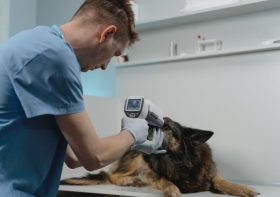What Special Veterinary Care Do Puppies Need?

Welcoming a new puppy into your home is an incredibly joyous occasion. Their playful antics and loving nature can bring endless smiles to any household. However, puppies require specific veterinary care to ensure they grow up healthy and strong. This article will guide you through the essential aspects of puppy care, covering everything from vaccinations to dental hygiene.
1. Comprehensive Puppy Check-Ups
The first step after bringing your new furry friend home should be a comprehensive veterinary check-up. This initial visit helps establish a baseline of health and identifies any existing conditions. Regular check-ups should continue throughout their first year to monitor growth and development.
Vital Signs and General Health
During a check-up, the puppy vet will assess vital signs, such as heart rate and temperature, and inspect your puppy’s overall physical condition. This helps identify any potential health issues early on.
2. Breeder and Shelter Health Checks
If your puppy comes from a breeder or shelter, it likely has undergone an initial health screening. However, it’s still crucial to follow up with your vet to ensure all health records are up to date and any necessary treatments are administered.
Common Breeder Health Screenings
Breeders often perform basic health checks, including initial vaccinations and deworming. Despite this, it’s still essential to have your vet conduct a thorough examination to confirm the puppy’s overall health.
3. Schedule for Vaccinations
One of the most critical aspects of puppy care is ensuring they receive their puppy vaccinations on time. Puppies are susceptible to various diseases, and timely vaccinations can prevent many common ailments.
Core Vaccinations
Core vaccinations are essential for all puppies and include vaccines for distemper, parvovirus, and rabies. These vaccines are typically administered in a series of shots over the first few months of the puppy’s life.
Non-Core Vaccinations
Depending on your geographical location and lifestyle, your vet may recommend non-core vaccines. These could include vaccines for Bordetella (kennel cough) or Lyme disease. Discussing your puppy’s lifestyle with your vet will help make informed vaccination decisions.
4. Nutrition and Dietary Needs
Proper nutrition is vital for your puppy’s growth and development. Puppies have different nutritional requirements than adult dogs, and it’s important to feed them high-quality puppy food.
Feeding Schedules
Puppies typically need small, frequent meals throughout the day. This feeding schedule supports their rapid growth and high energy levels. Consult with your vet to establish a feeding routine that works best for your specific breed.
Choosing the Right Food
Select a well-balanced puppy food that meets the nutritional standards set by veterinary authorities. Look for options that provide essential nutrients such as protein, fats, vitamins, and minerals for optimal growth.
5. Dental Hygiene for Puppies
Just like humans, puppies need regular dental care to prevent issues like plaque buildup and gum disease. Establishing a dental hygiene routine early on can save you from severe dental problems in the future.
Brushing Their Teeth
Start brushing your puppy’s teeth as soon as they are comfortable with it. Use a toothbrush and toothpaste designed specifically for dogs. Gradually introduce the brushing process to help your puppy get used to it.
Dental Chews and Treats
Dental chews and treats are also beneficial in maintaining your puppy’s oral health. These products help reduce plaque and tartar buildup and can be a fun treat for your young dog.
6. Importance of Parasite Control
Parasite prevention is another critical aspect of puppy care. Fleas, ticks, and worms can cause significant health issues in puppies. Your vet will recommend an appropriate parasite control plan tailored to your puppy’s needs.
Flea and Tick Prevention
Fleas and ticks can lead to skin irritations and more severe conditions, such as Lyme disease. To protect your puppy, use vet-recommended flea and tick preventatives.
Deworming Protocols
Puppies are often born with worms passed from their mother. Regular deworming treatments are essential to eliminate these parasites and prevent re-infestation.
7. Puppy Socialization and Behavior
Socialization is a crucial part of your puppy’s development. Exposing them to various environments, people, and other animals helps build confidence and reduces the risk of behavioral problems in the future.
Puppy Classes
Enroll your puppy in puppy classes to facilitate structured socialization. These classes often cover basic obedience and are a great way for your puppy to meet other dogs in a controlled environment.
Home Socialization Techniques
In addition to classes, ensure your puppy experiences different sights, sounds, and surfaces at home. Introduce them to household items like vacuums and blenders gradually to minimize fear and anxiety.
8. Spaying and Neutering Your Puppy
Spaying or neutering your puppy is a decision that has long-term health and behavioral benefits. Discussing the appropriate time and procedure with your vet is essential.
Health Benefits
Spaying and neutering can prevent certain cancers and eliminate the risk of unwanted litter. These procedures also have behavioral benefits, such as reducing the likelihood of marking and aggression.
Timing and Procedure
Your vet will guide you on the best age to spay or neuter your puppy based on their breed and overall health. The procedure is relatively simple, and most puppies recover quickly with proper care.
9. Exercise and Mental Stimulation
Regular exercise and mental stimulation are vital for a puppy’s health and well-being. Boredom and pent-up energy can lead to destructive behaviors, so it’s important to incorporate both physical and mental activities into their daily routine.
Physical Exercise
Engage your puppy in age-appropriate activities, such as short walks and playtime, in a safe environment. Over-exercising can be harmful, so it’s crucial to monitor your puppy’s activity level.
Mental Stimulation
Provide interactive toys and puzzles to keep your puppy mentally engaged. Training sessions are also an excellent way to challenge their minds while reinforcing good behavior.
10. Emergency Care Considerations
Knowing what to do in an emergency can save your puppy’s life. Familiarize yourself with symptoms that require immediate attention and have a plan in place for emergencies.
Common Puppy Emergencies
Some common emergencies include choking, poisoning, and severe allergic reactions. Recognizing these symptoms and responding quickly is crucial.
Preparing an Emergency Kit
Create an emergency kit with essentials such as a pet first aid kit, your vet’s contact information, and any necessary medications. This preparation can make a significant difference during a critical situation.
Regular visits to professionals like an Elk Grove vet can provide peace of mind by ensuring your puppy receives top-notch care. Ensuring your furry friend’s health through regular visits can help catch potential issues early.
Final Thoughts
Caring for a new puppy involves a comprehensive approach to their health and well-being. Regular check-ups, vaccinations, proper nutrition, and socialization are crucial components in raising a happy, healthy dog. Understanding and meeting these needs will ensure that your puppy grows into a strong and well-adjusted adult dog, providing endless joy and companionship for years to come.


